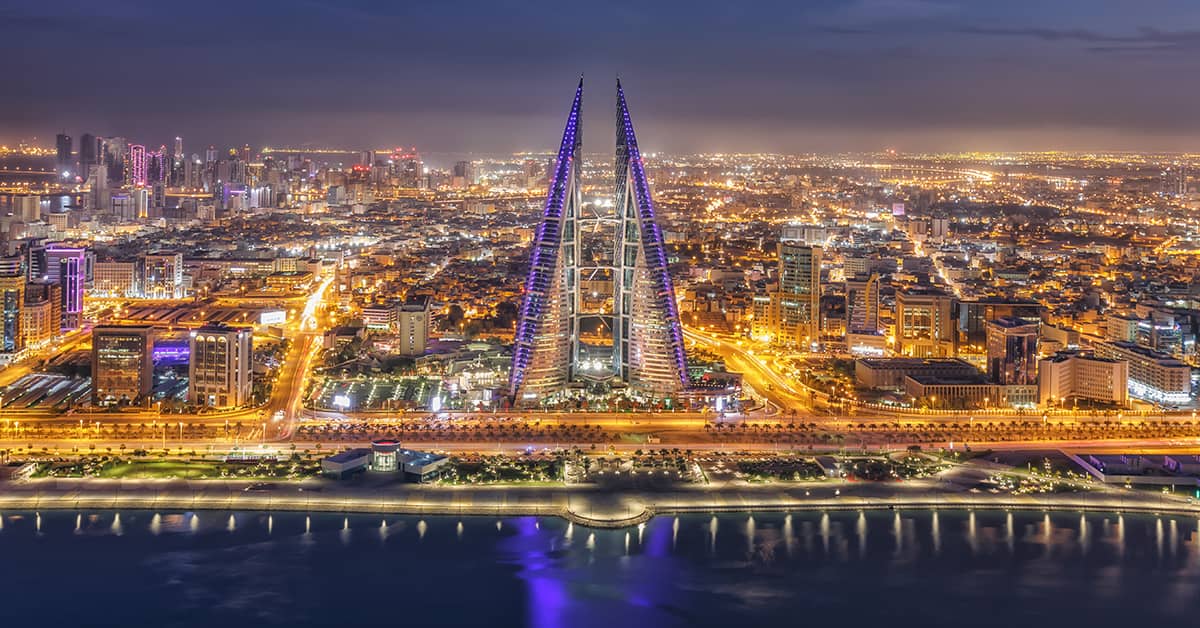Bahrain welcomes foreign direct investment as a solution to its needs.

|
VITAL STATISTICS |
|---|
|
Location: Southwest Coast of the Persian Gulf |
|
Neighbors: Connected to Saudi Arabia via the King Fahd Causeway (15.5 miles) |
|
Capital city: Manama |
|
Population (2020): 1,701,563 |
|
Official language: Arabic, English also widely used |
|
GDP per capita (2019): $23,433.40 |
|
GDP growth (2020): -5.8% |
|
Inflation (2020): -2.3% |
|
Currency: Dinar |
|
Investment promotion agency: Economic Development Board |
|
Investment incentives available: Some duty-free imports of materials and equipment; no restrictions on repatriation of capital; no currency restrictions |
|
Ease of Doing Business rank (2020): 43 |
|
Corruption Perceptions Index rank (2020): 42 |
|
Political risks: Election in 2022; continuing tension between Shi’a and Sunni communities; Bahrain and Israel agreed to normalize relations in September 2020 |
|
Security risks: Potential for spillover from hot spots, including Syria, Iran and Iraq |
|
PROS |
|---|
|
Economy is more diversified than others in the region |
|
Large, developed infrastructure |
|
Strong financial support from Saudi Arabia |
|
No restrictions on capital repatriation |
|
Duty-free access to Gulf Cooperation Council markets |
|
CONS |
|---|
|
Low foreign reserves, dependence on oil is still very high |
|
Low cash reserves |
|
Sources: Al Jazeera, Economic Development Board, Government of Canada, Global Travel Advisory, International Monetary Fund, Reuters, Transparency International, U.S. State Department, World Bank |
|
For more information, check out Global Finance‘s Bahrain Economic Report data page. |
The Kingdom of Bahrain has ambitious plans for post-pandemic growth. After a peak in May and June, Covid-19 cases declined and at time of writing, life is returning to normal with 65% of the population fully vaccinated and programs underway for children and adolescents. However, the Kingdom paid a high price: Lockdown measures drove down revenue in several sectors, including hotels and restaurants, resulting in a 36% decrease in their contributions to GDP.
To put itself in a better position, Bahrain, like many GCC governments, is striving to diversify its economy. Its Economic Development Board is one of the region’s most aggressive FDI promotion agencies, with an innovation hub in Manama for the exchange of ideas. The government beefed up contract laws to improve enforcement. Bahrain allows 100% foreign ownership in most sectors and does not require foreign companies to work through a local partnership.
These and other factors have attracted top-tier companies. They include hoteliers Ritz Carlton and Holiday Inn, accounting firms KPMG and EY, technology companies Cisco Systems and Huawei Technologies, financial companies American Express and Citi Group, and couriers DHL and FedEx. Bahrain’s largest investor countries are Saudi Arabia, Kuwait, India and the United Arab Emirates.
“The government is saying economic recovery is going to be very difficult, hence the focus on FDI,” says Pratyush Kumar Chaubey, assistant director of Investment Research at Acuity Knowledge Partners. “The government can only do so much. It is up to the companies to decide whether it is worth setting up. The whole financialecosystem does change very quickly.”
Headwinds Ahead
Despite its aggressive FDI push, the country’s macros are not in a very good position, according to Chaubey. “Bahrain is finding it difficult to meet the needs of its government programs and expenditures.”
Bahrain’s low credit rating—the lowest in the GCC according to multiple rating agencies—is driving up borrowing costs. Bahrain currently pays interest at 7% on bonds that mature in 2030, for example, while Oman pays 6.3% and the Emirate of Sharjah just 3.6% for the same duration.
Weighed down by the health crisis and a 7% contraction of the non-oil sector, growth slipped into contraction in 2020—the economy shrank nearly 6%. A World Bank report suggests GDP growth could reach 3.3% in 2021 and continue at that pace for the medium term, while acknowledging that recovery is tied to domestic consumption, increased tourism, and oil and aluminum prices.
“Bahrain’s GDP is very volatile,” notes Chaubey. “As GDP is highly dependent on oil price and oil price is very volatile, we see large swings in GDP from one year to another which forces the government to focus on short-term policymaking rather than long-term.”
Bahrain’s breakeven price for 2021 is $88.20 per barrel, a price unlikely in the current economic environment. As of September 15, oil was at $74 a barrel.



